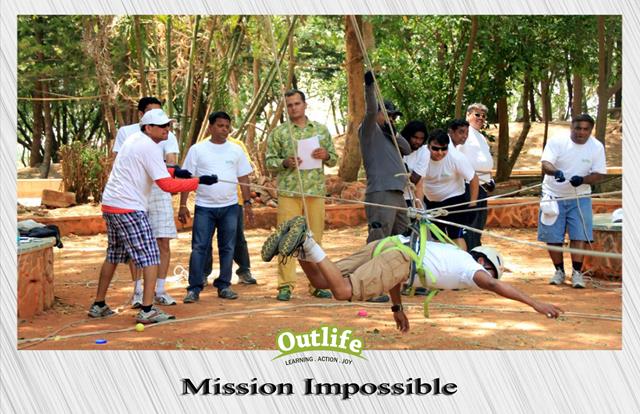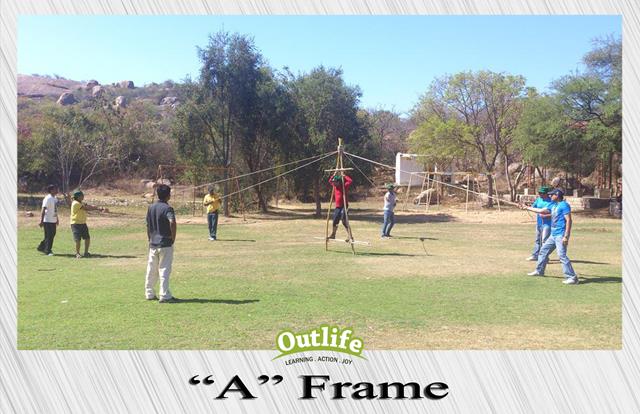How to Become an Outbound OBT Trainer
Ultimate Guide on How to Become an Outbound OBT Trainer.
If your passion lies in empowering others to reach their full potential, then becoming an outbound trainer might be your calling. This comprehensive guide is your ticket to mastering the art of outbound training and elevating your skills to the next level. Whether you're a seasoned professional seeking fresh insights or a newcomer eager to carve a niche in the experiential learing industry, this guide is designed to equip you with the essential knowledge and strategies required to excel in outbound training.
So, whether you're seeking to revamp your training approach or kickstart a rewarding career in outbound training, let's embark on this transformative journey together. It's time to unleash your potential and become the outbound trainer you've always aspired to be.
Outbound Training or Outbound Learning is a sought after experiential methodology for training, education and development for corproates and institues alike. Many trainers who are looking to start their journey in outbound training or OBT Training are often confused as to where to begin and how to go about becoming a successful and effective outbound trainer.
Outbound Training by its very nature requires variety of skills that are acquired more from practice than by studying content or concepts. Its similar to learning swiming where one has to get into the pool. Content and concepts can help with abstract understanding but no amount of abstract learning can teach outbound training skills except the practice of it.
So, whether you're seeking to revamp your training approach or kickstart a rewarding career in outbound training, let's embark on this transformative journey together. It's time to unleash your potential and become the outbound trainer you've always aspired to be.
Outbound Training or Outbound Learning is a sought after experiential methodology for training, education and development for corproates and institues alike. Many trainers who are looking to start their journey in outbound training or OBT Training are often confused as to where to begin and how to go about becoming a successful and effective outbound trainer.
Outbound Training by its very nature requires variety of skills that are acquired more from practice than by studying content or concepts. Its similar to learning swiming where one has to get into the pool. Content and concepts can help with abstract understanding but no amount of abstract learning can teach outbound training skills except the practice of it.
Understanding outbound training
Outbound training, also known as experiential learning or adventure-based learning, is a holistic approach to personal and professional development. It involves immersive activities and challenges that encourage participants to step out of their comfort zones, foster teamwork, and develop problem-solving skills.
Unlike traditional classroom-based training, outbound training takes place in natural outdoors or simulated environments, offering a hands-on experience that enhances learning retention and application.
The impact of outbound training extends beyond individual skill development. It creates a shared experience that strengthens relationships, improves communication, and fosters a sense of camaraderie among participants. As an outbound trainer, you become a catalyst for transformation, guiding individuals and teams through immersive experiences that unlock their potential and drive positive change within organizations.
Unlike traditional classroom-based training, outbound training takes place in natural outdoors or simulated environments, offering a hands-on experience that enhances learning retention and application.
The impact of outbound training extends beyond individual skill development. It creates a shared experience that strengthens relationships, improves communication, and fosters a sense of camaraderie among participants. As an outbound trainer, you become a catalyst for transformation, guiding individuals and teams through immersive experiences that unlock their potential and drive positive change within organizations.
Essential qualities of an outbound trainer
Becoming an effective outbound trainer requires a unique set of qualities that go beyond traditional teaching or coaching roles. Strong leadership skills, adaptability, empathy, and a passion for experiential learning are essential attributes for success in this dynamic field.
The ability to inspire and motivate others, coupled with a keen sense of observation and adaptability, distinguishes outstanding outbound trainers from the rest.
Effective communication is at the heart of outbound training. As a trainer, you must be able to convey instructions clearly, provide constructive feedback, and facilitate meaningful debriefing sessions. Empathy and active listening skills are crucial for understanding the needs and concerns of participants, creating a supportive and inclusive learning environment.
The ability to inspire and motivate others, coupled with a keen sense of observation and adaptability, distinguishes outstanding outbound trainers from the rest.
Effective communication is at the heart of outbound training. As a trainer, you must be able to convey instructions clearly, provide constructive feedback, and facilitate meaningful debriefing sessions. Empathy and active listening skills are crucial for understanding the needs and concerns of participants, creating a supportive and inclusive learning environment.
The following are some guidelines and recommendations for becoming an outbound trainer.
1) Passion
Those who aspire to be trainers in the field of outbound experiential learning, whether it is outbound training, team building, behavioral skills training, should have a natural passion for serving and educating people. They should have a vision of supporting people to leverage their innate human potential and help them grow as a person/professional with the required knowledge skills and attitude.
2) Developing Knowledge
They should develop required knowledge and skills in the areas of Training and Facilitation, Training Needs Identification, Instructional Design, Processing / Debrief Skills, Feedback and Training evaluation.
They should develop practical aspects of outbound facilitation skills that include delivering training that are based on Adult learning principles, Experiential Learning Principles. Practical Knowledge of various Learning Orientations, Learning Experience Delivery, and Immersive group engagement is a much-needed skill for outbound trainers.
3) Outbound Training Skills and Practice
To excel as an outbound trainer, it's essential to continually develop and refine a diverse set of skills. Facilitation skills play a vital role in engaging participants and delivering impactful training sessions. Mastering the art of facilitation is key to creating a dynamic and immersive learning experience.
he ability to guide discussions, manage group dynamics, and navigate challenging situations with grace and professionalism is fundamental for successful outbound training. Debriefing skills and asking powerful questions are invaluable in creating transformation through outbound training activities.
These skills are important part of becoming an outbound trainer and includes
4) Outbound training techniques and activities
A diverse range of techniques and activities form the foundation of outbound training. From high ropes courses and team-building challenges to problem-solving exercises and trust-building activities, each component serves a unique purpose in fostering personal and professional growth. These activities are carefully designed to stretch participants beyond their comfort zones, encouraging them to embrace uncertainty, collaborate with others, and develop resilience.
The use of metaphors and analogies in outbound training activities can create powerful connections between the experiential learning process and real-world challenges. By drawing parallels between the obstacles faced during activities and the challenges encountered in the workplace, participants gain valuable insights that can be directly applied to their professional roles.
5) Love for Outdoors, Adventure and Nature
A lot that happens in outbound happens in the magic of nature. A love and relationship with nature helps one to personally connect and use nature as part of the learing with metaphors and analogies. Having a understanding of the way nature works, knowledge of trees, rocks, birds etc helps to connect participants with the appreciation and beauty of the sorrundings
6) Designing effective outbound training programs
The design of an outbound training program is crucial to its success. It involves careful planning, consideration of participant demographics, and the identification of specific learning objectives. Tailoring activities to align with the goals of the training program is essential for delivering meaningful experiences that resonate with participants.
When designing outbound training programs, it's important to create a balance between challenging activities and opportunities for reflection and debriefing. This approach allows participants to apply their learning in real-time, followed by structured discussions that reinforce key takeaways and insights. By carefully crafting the flow of activities, you can create a seamless and impactful training experience that leaves a lasting impression on participants.
7) Training Modalities
Getting trained in others training modalities can add more effectiveness. Modalities that go along with Outbound Training are
8) Good Health, Phhysical, Emotional and Mental Fitness:
Outbound Trainers needs to have good health and fitness as the work requires standing for long hours. An ability to emotionally connecct with participants and demostrate resilience during conflicts and challening activities. Its the composure of the trainer that will influence and motivate the participants to trust and engage with the learnign and challenges of outbound training.
9) Apprenticeship and Mentoring
Apprenticeship and Mentoring is an essential part of outbound training. its important to find a competent mentor who can guide you and include you in the practical aspects of running an outbound training session.
Becoming a outbound trainer is a continuous journey of learning and practice. An essential part of this journey is experiencing the training as a participant, observer, and facilitator, so that one can observe, feel, and relate to different roles and have a firsthand understanding of the entire outbound training cycle and process.
10) Safety and risk management in outbound training
Ensuring the safety and well-being of participants is a top priority for outbound trainers. Comprehensive risk assessments, thorough equipment checks, and adherence to industry safety standards are essential for creating a secure training environment. Prioritizing participant safety instills confidence and trust, allowing them to fully engage in the learning process without undue concerns.
Effective risk management involves proactive measures to mitigate potential hazards and address emergency situations. Trainers must be prepared to handle unexpected events with professionalism and efficiency, ensuring that participants feel supported and secure throughout the training program. By maintaining a strong focus on safety and risk management, outbound trainers uphold the integrity and reputation of their training initiatives.
6) Fraternity and Team
It takes time to master and learn all the outbound training skills and its a great idea to be part of a fraternity of outbound trainers and expereintial educators. This helps you in 1-1 learning from other trainers and also co-facilitating programs together based on your expertise.
A lot of times you will have to take help of experts for various activities that may include adventure, outdoors etc. its good to build relations and include other trainers and support staff in your programs. This helps in not only dividing the tasks but conserve your energy and focus on learning.
Learn more on how to plan an outbound training for your company
1) Passion
Those who aspire to be trainers in the field of outbound experiential learning, whether it is outbound training, team building, behavioral skills training, should have a natural passion for serving and educating people. They should have a vision of supporting people to leverage their innate human potential and help them grow as a person/professional with the required knowledge skills and attitude.
2) Developing Knowledge
They should develop required knowledge and skills in the areas of Training and Facilitation, Training Needs Identification, Instructional Design, Processing / Debrief Skills, Feedback and Training evaluation.
They should develop practical aspects of outbound facilitation skills that include delivering training that are based on Adult learning principles, Experiential Learning Principles. Practical Knowledge of various Learning Orientations, Learning Experience Delivery, and Immersive group engagement is a much-needed skill for outbound trainers.
3) Outbound Training Skills and Practice
To excel as an outbound trainer, it's essential to continually develop and refine a diverse set of skills. Facilitation skills play a vital role in engaging participants and delivering impactful training sessions. Mastering the art of facilitation is key to creating a dynamic and immersive learning experience.
he ability to guide discussions, manage group dynamics, and navigate challenging situations with grace and professionalism is fundamental for successful outbound training. Debriefing skills and asking powerful questions are invaluable in creating transformation through outbound training activities.
These skills are important part of becoming an outbound trainer and includes
- Outdoor Leadership Skills
- Safety and Wilderness First Aid Training
- Trekking, Outdoor and Adventure Skills
- Expereince leading and working with Groups in the Outdoors
- Experiential learning Mastery
- Adult Learning Theory
- Facilitation Skills to run, brief and debrief Outbound Activities
- Program Design and programming
- Understanding of Different Behavioral Skills and competencies
- Concepts and Models of Training like Johari window, Learning combination Lock,
- Debrief and Processing Skills
- Strong Leadership Skills
- Persona that reflects Expertise, Confidence and Competence
4) Outbound training techniques and activities
A diverse range of techniques and activities form the foundation of outbound training. From high ropes courses and team-building challenges to problem-solving exercises and trust-building activities, each component serves a unique purpose in fostering personal and professional growth. These activities are carefully designed to stretch participants beyond their comfort zones, encouraging them to embrace uncertainty, collaborate with others, and develop resilience.
The use of metaphors and analogies in outbound training activities can create powerful connections between the experiential learning process and real-world challenges. By drawing parallels between the obstacles faced during activities and the challenges encountered in the workplace, participants gain valuable insights that can be directly applied to their professional roles.
5) Love for Outdoors, Adventure and Nature
A lot that happens in outbound happens in the magic of nature. A love and relationship with nature helps one to personally connect and use nature as part of the learing with metaphors and analogies. Having a understanding of the way nature works, knowledge of trees, rocks, birds etc helps to connect participants with the appreciation and beauty of the sorrundings
6) Designing effective outbound training programs
The design of an outbound training program is crucial to its success. It involves careful planning, consideration of participant demographics, and the identification of specific learning objectives. Tailoring activities to align with the goals of the training program is essential for delivering meaningful experiences that resonate with participants.
When designing outbound training programs, it's important to create a balance between challenging activities and opportunities for reflection and debriefing. This approach allows participants to apply their learning in real-time, followed by structured discussions that reinforce key takeaways and insights. By carefully crafting the flow of activities, you can create a seamless and impactful training experience that leaves a lasting impression on participants.
7) Training Modalities
Getting trained in others training modalities can add more effectiveness. Modalities that go along with Outbound Training are
- Experiential Education
- Adventure Programming
- Cooperative Play Activities
- Team Building Facilitation
- Neuro-Linguistic Programing,
- Behavioral Psychology,
- Group Process work,
- Non-Violent Communication,
- Psychometric Assessments,
- Transaction Analysis,
- Storytelling,
- Team Coaching will be an advantage.
8) Good Health, Phhysical, Emotional and Mental Fitness:
Outbound Trainers needs to have good health and fitness as the work requires standing for long hours. An ability to emotionally connecct with participants and demostrate resilience during conflicts and challening activities. Its the composure of the trainer that will influence and motivate the participants to trust and engage with the learnign and challenges of outbound training.
9) Apprenticeship and Mentoring
Apprenticeship and Mentoring is an essential part of outbound training. its important to find a competent mentor who can guide you and include you in the practical aspects of running an outbound training session.
Becoming a outbound trainer is a continuous journey of learning and practice. An essential part of this journey is experiencing the training as a participant, observer, and facilitator, so that one can observe, feel, and relate to different roles and have a firsthand understanding of the entire outbound training cycle and process.
10) Safety and risk management in outbound training
Ensuring the safety and well-being of participants is a top priority for outbound trainers. Comprehensive risk assessments, thorough equipment checks, and adherence to industry safety standards are essential for creating a secure training environment. Prioritizing participant safety instills confidence and trust, allowing them to fully engage in the learning process without undue concerns.
Effective risk management involves proactive measures to mitigate potential hazards and address emergency situations. Trainers must be prepared to handle unexpected events with professionalism and efficiency, ensuring that participants feel supported and secure throughout the training program. By maintaining a strong focus on safety and risk management, outbound trainers uphold the integrity and reputation of their training initiatives.
6) Fraternity and Team
It takes time to master and learn all the outbound training skills and its a great idea to be part of a fraternity of outbound trainers and expereintial educators. This helps you in 1-1 learning from other trainers and also co-facilitating programs together based on your expertise.
A lot of times you will have to take help of experts for various activities that may include adventure, outdoors etc. its good to build relations and include other trainers and support staff in your programs. This helps in not only dividing the tasks but conserve your energy and focus on learning.
Learn more on how to plan an outbound training for your company
Mastering Outbound Training
Some of the training sessions that are based on outbound training include recreational outbounds, educational outbounds, team building interventions, behavioral skills training, and outdoor management development.
Trainers planning to conduct outbound training that is based on experiential learning have to develop a thorough understanding of the entire outbound training life cycle, including training needs analysis, program design, Program delivery, Feedback, and evaluation.
The trainers have to be well versed in Experiential learning theory, Adult Learning Theory, outbound training principles, and team building methodologies. Practices and activities that include outdoor, adventure, group development, and team building activities that help create an immersive and impactful learning experience.
The trainers must develop facilitation skills in areas of creating safe space, group engagement, belonging and inclusion, processing and debriefing, creative learning techniques, action planning, and transference of learning to the workplace.
For trainers who want to deliver adventure, outdoor, outbound training will need to take certifications in adventure and outdoor technical skills, Wilderness First aid. If this cannot be done, then hire or partner with a qualified outdoor/adventure instructor.
The trainers also need to equip themselves with using a variety of training resources that can include workbooks, handouts, videos, and a plethora of training activities.
The path to becoming an outbound trainer is a transformative journey that requires dedication, passion, and a commitment to ongoing growth. By honing essential qualities, developing diverse skills, and designing impactful training programs, you can embark on a rewarding career that empowers individuals and teams to unleash their full potential. Embrace the challenges, celebrate the victories, and remain steadfast in your pursuit of excellence as an outbound trainer. Your impact has the power to drive lasting change and inspire others to reach new heights of personal and professional success.
Trainers planning to conduct outbound training that is based on experiential learning have to develop a thorough understanding of the entire outbound training life cycle, including training needs analysis, program design, Program delivery, Feedback, and evaluation.
The trainers have to be well versed in Experiential learning theory, Adult Learning Theory, outbound training principles, and team building methodologies. Practices and activities that include outdoor, adventure, group development, and team building activities that help create an immersive and impactful learning experience.
The trainers must develop facilitation skills in areas of creating safe space, group engagement, belonging and inclusion, processing and debriefing, creative learning techniques, action planning, and transference of learning to the workplace.
For trainers who want to deliver adventure, outdoor, outbound training will need to take certifications in adventure and outdoor technical skills, Wilderness First aid. If this cannot be done, then hire or partner with a qualified outdoor/adventure instructor.
The trainers also need to equip themselves with using a variety of training resources that can include workbooks, handouts, videos, and a plethora of training activities.
The path to becoming an outbound trainer is a transformative journey that requires dedication, passion, and a commitment to ongoing growth. By honing essential qualities, developing diverse skills, and designing impactful training programs, you can embark on a rewarding career that empowers individuals and teams to unleash their full potential. Embrace the challenges, celebrate the victories, and remain steadfast in your pursuit of excellence as an outbound trainer. Your impact has the power to drive lasting change and inspire others to reach new heights of personal and professional success.
Certification in Outbound Training
Certification and professional development for outbound trainers
Obtaining relevant certifications and pursuing continuous professional development are essential steps for outbound trainers to enhance their skills and credibility. Accredited certifications in outdoor leadership, facilitation, and adventure-based learning validate your expertise and demonstrate a commitment to upholding industry standards and best practices.
Professional development opportunities, such as attending workshops, pursuing advanced certifications, and seeking mentorship from seasoned outbound trainers, contribute to ongoing growth and refinement of your training capabilities. Staying abreast of industry trends, research, and emerging best practices equips you with the knowledge and insights needed to deliver cutting-edge outbound training experiences.
Any certification ensures that the participants has the knowledge and skills to deliver the training. While Outbound Training is best learnt through practice and mentoring . Certification ensures that participants are familiar with analysis, design and delivery of Outbound Training Programs.
Outlife offers the following certification programs for trainers and faciltiators to development capability and competence in outbound training
Certified Outbound Trainer
Certified Outdoor Leader
Obtaining relevant certifications and pursuing continuous professional development are essential steps for outbound trainers to enhance their skills and credibility. Accredited certifications in outdoor leadership, facilitation, and adventure-based learning validate your expertise and demonstrate a commitment to upholding industry standards and best practices.
Professional development opportunities, such as attending workshops, pursuing advanced certifications, and seeking mentorship from seasoned outbound trainers, contribute to ongoing growth and refinement of your training capabilities. Staying abreast of industry trends, research, and emerging best practices equips you with the knowledge and insights needed to deliver cutting-edge outbound training experiences.
Any certification ensures that the participants has the knowledge and skills to deliver the training. While Outbound Training is best learnt through practice and mentoring . Certification ensures that participants are familiar with analysis, design and delivery of Outbound Training Programs.
Outlife offers the following certification programs for trainers and faciltiators to development capability and competence in outbound training
Certified Outbound Trainer
Certified Outdoor Leader




